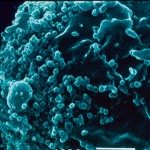Link to Pubmed [PMID] – 21767373
Retrovirology 2011;8:58
BACKGROUND: Maternofetal transmission (MFT) of HIV-1 is relatively rare during the first trimester of pregnancy despite the permissivity of placental cells for cell-to-cell HIV-1 infection. Invasive placental cells interact directly with decidual cells of the uterine mucosa during the first months of pregnancy, but the role of the decidua in the control of HIV-1 transmission is unknown.
RESULTS: We found that decidual mononuclear cells naturally produce low levels of IL-10, IL-12, IL-15, TNF-α, IFN-α, IFN-γ and CXCL-12 (SDF-1), and large amounts of CCL-2 (MCP1), CCL-3 (MIP-1α), CCL-4 (MIP-1β), CCL-5 (Rantes), CXCL-10 (IP-10), IL-6 and IL-8. CCL-3 and CCL-4 levels were significantly upregulated by in vitro infection with R5 HIV-1 but not X4. Decidual CD14+ antigen presenting cells were the main CCL-3 and CCL-4 producers among decidual leukocytes. R5 and X4 HIV-1 infection was inhibited by decidual cell culture supernatants in vitro. Using HIV-1 pseudotypes, we found that inhibition of the HIV-1 entry step was inhibited by decidual soluble factors.
CONCLUSION: Our findings show that decidual innate immunity (soluble factors) is involved in the control of HIV-1 infection at the maternofetal interface. The decidua could thus serve as a mucosal model for identifying correlates of protection against HIV-1 infection.
